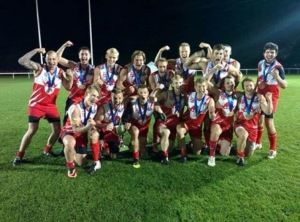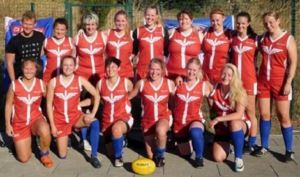News
The rise of Aussie Rules Football in Denmark
This article is more than 7 years old.
Danes love all things Australian and ‘Aussie Rules’ or ‘Australsk Fodbold’ is no exception

Denmark Vikings winning their first-ever medals at Euro Cup 2015 (London)
Australia’s unique national football code involves 18 players on an oval field trying to kick a rugby-shaped football made out of kangaroo leather through two goal posts.
The professional competition in Australia, known as AFL, is a mix of football, rugby, cricket and handball and is the 4th best-attended sporting event in the world (behind NFL, Bundesliga and the Premier League).
If this excites you then why not join the 300 players that compete across the country in the Danish Australian Football League (DAFL) and the Women’s Nordic Australian Football League (WNAFL)? The quality of play in Denmark is very high with the men’s national team, the Denmark Vikings, winning the gold medal at the AFL Euro Cup in 2015 and 2016. The women’s national team, the Denmark Valkyries, are also strong, taking home the silver in 2015.
Moving forward by leaps and bounds
The first official bounce of an AFL ball in Denmark was in Zealand in 1991 when three Copenhagen based teams, mainly consisting of Australian expats, formed the Danish Australian Football league. Fast forward 27 years to 2018 and there is much greater diversity found – both with the players’ nationalities and the location of the teams.
There are still plenty of Aussies to find amongst the team members, but Danes and Swedes now make up the majority of the players. Yes Swedes (and all nationalities) are welcome! DAFL has two Swedish teams, the Helsingborg Saints and Port Malmø Maulers, and one WNAFL team, Port Malmø Lynx based in Sweden.
The Greater Copenhagen area is represented by three teams, the Copenhagen Barracudas, Copenhagen Giants and Farum Cats in the DAFL – and the Farum Wildcats in the WNAFL. Odense is home to the Odense Lions and Lionesses and Aalborg has the mighty Aalborg Kangaroos.
2017 saw the Barracudas become DAFL premiers overcoming the Cats in a hard-fought Grand Final. The Copenhagen based teams have won the last three flags (victories), but 2018 could be the year that the flag goes to one of the Swedish teams who only has one win between them.
The Aalborg Kangaroos played in the Grand Final in 2015 – losing a close match to the Giants, and will be pushing hard for their first flag in 2018. AFL in Odense is growing quickly and the Lions (DAFL) and the Lionesses (WNAFL) are leading the way in Denmark when it comes to recruitment. Both teams boast a talented list of young and exciting players who will be looking to make their mark in 2018.
Why not join us?
Clubs are always looking for new players, umpires and coaches no matter your experience level. If you are interested in joining the community as a player, trying your hand at coaching or you just want to get involved – feel free to contact either one of the clubs, or the DAFL.
Contact information can be found through www.dafl.dk, where you can find the table, fixture, training information and history of the league. The fixture list follows the AFL season in Australia, with games from April to September/October. As the Aussies say, let’s go have a kick of the footy!
The author is President of the DAFL.











































